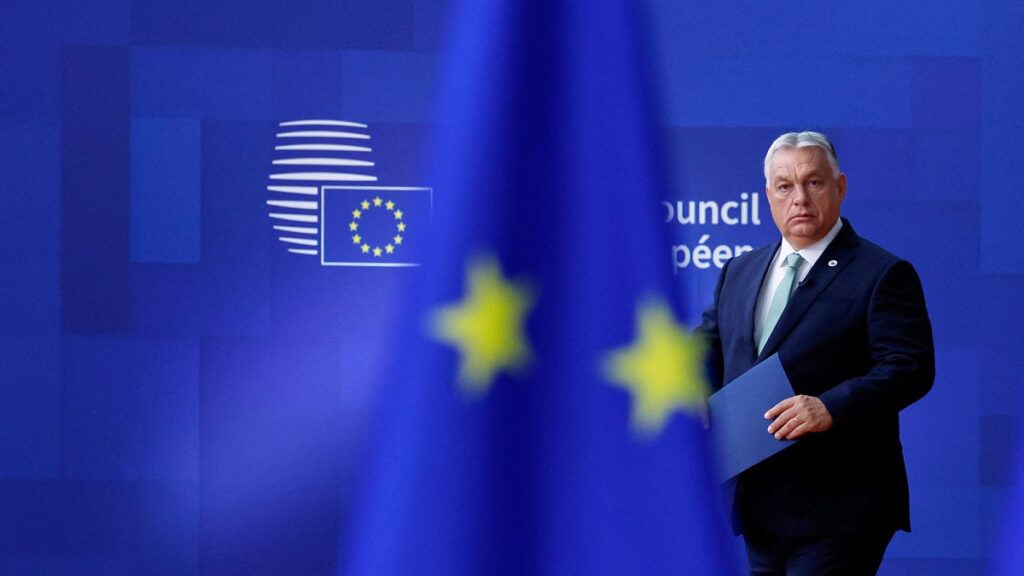MEPs are trying to prevent Hungarian Premier Viktor Orbán from accessing blocked EU funds after the Midterm Review of the EU’s Cohesion Funds.
This review aims to reshuffle previously unused funds for defence and for dual-use goods and to speed up the spending of the funds in the second half of the EU’s seven-year budgetary period.
MEPs claim that the Hungarian government could unfreeze some money previously blocked by the Commission, with the help of the reallocation, without fulfilling the EU’s conditions of academic freedom or LGBTI rights.
Hungary has already sought re-shuffling of Cohesion Funds
German Green MEP Daniel Freund told Euronews that the Hungarian government has already received €160 million of formerly frozen funds and is willing to withdraw another €600 million.
“Orbán is once again playing games. He tries to shift money from frozen funds into pots that are still available to him. Until Hungary restores the rule of law, not a single cent should be released. If we fail to stop this Orbán can “unfreeze” up to €1,68 billion. The Commission must not allow it,” Freund said.
Euronews was not able to verify the claim that 160 million euros of frozen funds have been paid to Hungary. The Commission did not comment on Hungary’s demand for the fresh 600 million euros.
“We invite member states to adjust and modify their cohesion programmes to adapt them to the new Commission priorities. This is an ongoing exercise, as other Member States Hungary, is taking part in this exercise, but since it’s not concluded yet, I cannot confirm any figures or amounts. It should be concluded in the coming months,” said Commission spokesperson Maciej Berestecki, adding that any such payment needs the prior agreement of the Commission.
The Hungarian government refused to comment on the matter, saying talks are ongoing about the Cohesion funds.
The Commission moved to calm MEPs
The European Commission had earlier attempted to assure MEPs that the rule of law would be highlighted even after the review.
“If the condition and the regulation are in application, and if funds have been frozen under that instrument, you can rest assured that those funds cannot be touched, cannot be affected by the potential flexibilities which exist under the cohesion policy,” Balázs Ujvári, spokesperson of the European Commission, told Euronews.
Commission Vice President Raffale Fitto also intervened when he sent a letter to the chair of the European Parliament’s REGI Committee, making clear that the Berlaymont will not green light any payment requests subject to previous freezes.
“The Commission remains committed to ensuring the rule of law is upheld in the implementation of the funds and will assess any request for programme amendments in line with the Common Provisions Regulation (CPR), the Rule of Law Conditionality Regulation, and the provisions of the Mid-Term Review Regulation,” Rafaella Fitto wrote in a mail, published on the Parliament’s website.
MEPs warn of the lack of legal guarantees
But according to Tinneke Strik, a Dutch MEP, who is also the Parliament’s rapporteur on Hungary, this statement cannot be considered a legally binding commitment, and Hungary could use loopholes in the existing regulation to withdraw money.
Daniel Freund also cited another possible loophole Hungary could use, claiming that a reallocation of up to 8% wouldn’t trigger interference of the Commission.
Earlier, in June, the Parliament’s REGI Committee proposed to open the CPR Regulation to include stronger safeguards, but this was not possible for legal reasons.
Klára Dobrev, an S&D MEP from Hungary, also thinks that the Midterm Review will not give enough safeguards.
“Having thoroughly explored the topic of the mid-term review of the EU budget, we have concluded that we should not be satisfied with the European Commission’s commitment. Von der Leyen and the EPP gave Orbán an ‘election gift’ in 2022 and 2024 as well. The promise was in vain, and the possibility of this has not been ruled out now either. The eyes of the world will be on them, and ours too, to see whether they keep their word. But this guarantee cannot be said to be sufficient,” Dobrev told Euronews.
Dobrev was one of the 8 MEPs voting against the Midterm Review proposal at the REGI committee on Wednesday afternoon. But the majority, 27 members in favour and 5 abstentions, approved the text, meaning it will go to the Plenary session next week, where it is likely to be approved.
Most of the Hungarian funds are blocked by Brussels for rule of law worries
If Hungary were able to release some cohesion funds, previously blocked for rule of law and corruption issues, that would be a major win for Prime Minister Viktor Orbán.
Overall €18 billion of a total of €28 billion is frozen as a result of activation of the Rule of Law Mechanism, because of corruption concerns, and, in the case of the Cohesion Funds, the non-fulfilment of the Charter of EU Fundamental Rights. Here, Hungary has been asked to safeguard academic freedom, the protection of LGBTI rights, and the respect for the right of asylum to access funds.
Back in December 2023, the European Commission released €10,2 billion of previously frozen Cohesion Funds to Hungary, just before a key EU summit where Viktor Orbán lifted his veto on the €50 billion aid package for Ukraine. Then, Many MEPs accused the EU of striking a secret deal with Budapest, and threatened the Commission with legal action. Those critical of the process believe, without strong and legally binding guarantees, the allocation of funds can up sore similar deals with Viktor Orbán in the future.
Read the full article here

